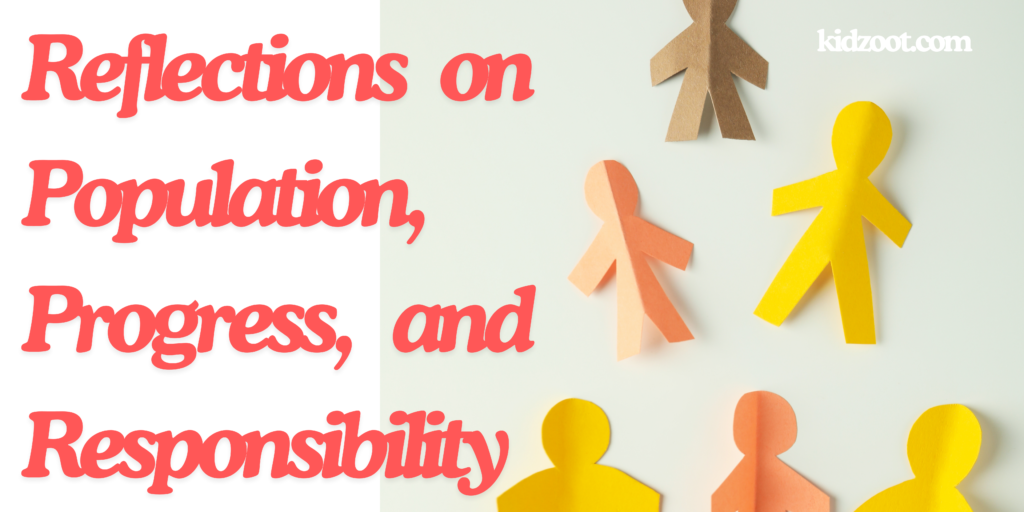Today, there is a lot of talk about how India and China have such large populations, but now it is becoming clear that a significant decline is coming. People in India say it’s because of poverty, unemployment, and mental health issues, while people in China say it is happening because of development. Both perspectives are related to the same issue, but they present different views. The disappearance of population may change what it means to be human in humanity. In today’s time, where the world is moving increasingly towards AI (artificial intelligence), the need for humans might also decrease. And perhaps some people no longer want to take on the tension, thinking that children are a burden. Often, people in life do not want to cause tension for anyone, perhaps not even for themselves. But the issue is not that humans are decreasing; that is not the problem. The real problem is that people see the growing population as a huge threat. Perhaps because they think fewer people would lead to fewer problems. But they may not know that a small population can lead to even more problems.
A few years ago, the coronavirus claimed the lives of many, but what happened? It wasn’t just a few people who were lost. No, you’re thinking too small. Not only were the people lost, but also those connected to them were lost. You may not see them, but they were also lost. I’m talking about the lives of those who would have been born to those who died, for whom perhaps you feel no pain—because you don’t have any emotional connection to them. This is a very old human nature: we don’t feel the pain of others, and sometimes we are even in a state of pleasure. But think for a moment, what if something like this happens again in the future? What if a virus or disaster happens every 10 years? Would a smaller population be better then? Definitely not—it could make things even worse, and it’s not just in India and China, but many places around the world are facing population decline. Governments used to run schemes like “two children per family,” but now, perhaps, they will have to change their approach.
If you look at this carefully, you’ll realize that the cities we are building, the bridges, the highways, who will they be for in the future? Are we so self-centered that in pursuit of our own happiness, we are taking away the happiness of future generations? The truth is, why should we care for those who don’t even exist yet? We will only care about ourselves. But, can’t we return nature its trust? We need to think about this. Perhaps we have lost our way somewhere; maybe we don’t even care for ourselves anymore, just working without thinking, because everyone is doing it. Without thinking, without understanding. But why not, after all, work is divine. China’s philosophy is based on this. I could argue more about whether religion and rituals affect this, but that’s a separate issue. Yes, nature follows a simple law: anything that increases cannot continue at the same rate forever—except at one point. Perhaps the speed of the universe’s expansion also slows down over time. I don’t know for sure, but perhaps I can tell someone that you are a trust of nature, and nature will claim its trust from you. If you give it, that’s fine; if not, perhaps that’s also fine. But think about the first living beings or substances that could have perished at that time. Time, too, must have been very tough then, but maybe they, with courage, with strong will, and with a spark of hope in their eyes, moved forward. Some may have lost their lives, some may have broken, but they went with the faith that their struggle might one day give rise to something beautiful. Perhaps that fire, that passion, is still within us, that same fervor flowing through our blood, which urges us to better ourselves.
But perhaps, when you are sitting peacefully with a smile on your face, you should think for a moment: Can I give someone else a chance? Is anyone else worthy of that smile? Wherever humans go, it will always be in their hands. And no matter how intelligent robots become, they will never have emotions. They might say a few lines of praise that make you feel good, but as soon as you realize that they or their parts will last much longer, you might no longer find love in their words. In fact, you won’t find love in their eyes anyway, because our eyes hold the entire world within them, not in a JPEG format.
People will need people, and who knows, perhaps someone in the future will bring new hope, a new ray of light, that will fill our hearts with peace and love. As humans, we may not be able to do much, but perhaps we can console ourselves and wish for a better tomorrow. It is these things that make us human. And these very things give us hope that tomorrow might be better. We might be weak in many ways, but perhaps fulfilling our duty is something everyone likes to do, and why wouldn’t we? It is tied to human ego. And this is our duty today: to return nature its trust and work towards a better tomorrow.
![Picture of Abhishek Sonkar [Author]](https://kidzoot.com/wp-content/uploads/2023/07/Front-photo-for-Website-300x300.webp)
Abhishek Sonkar [Author]
Meet Abhishek Sonkar, [B.com, B.Ed., M.Ed.], a child development specialist with years of experience in the field. He has written numerous blog posts on child development and parenting.

